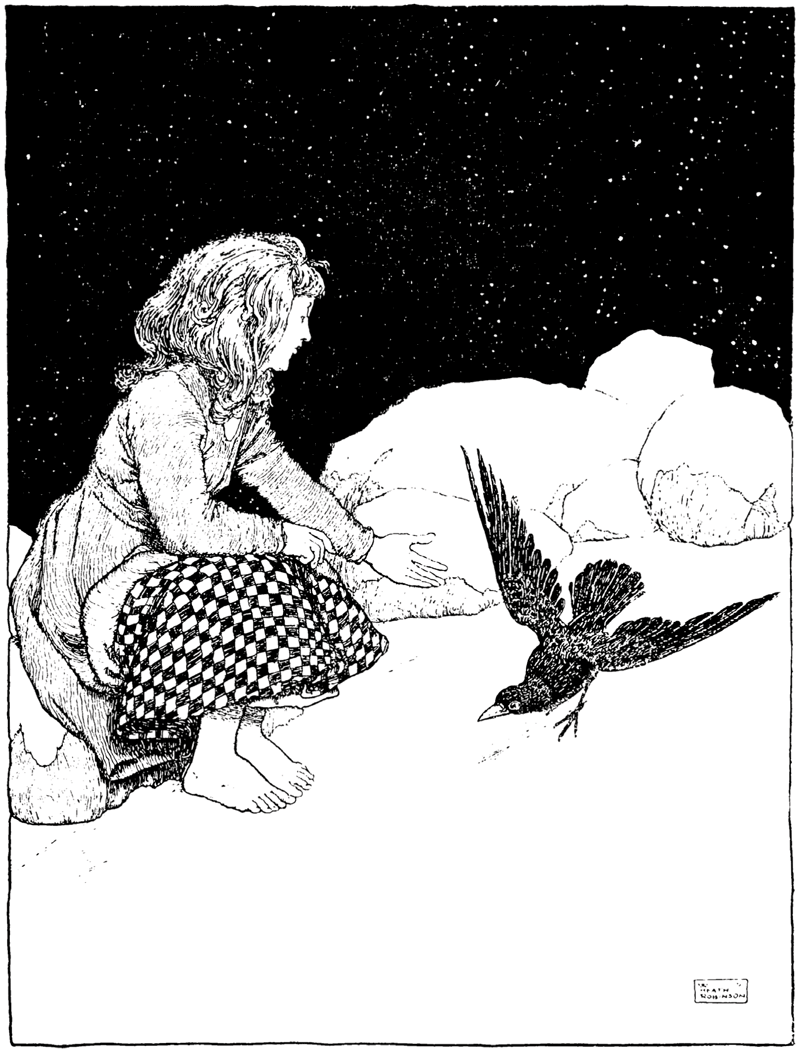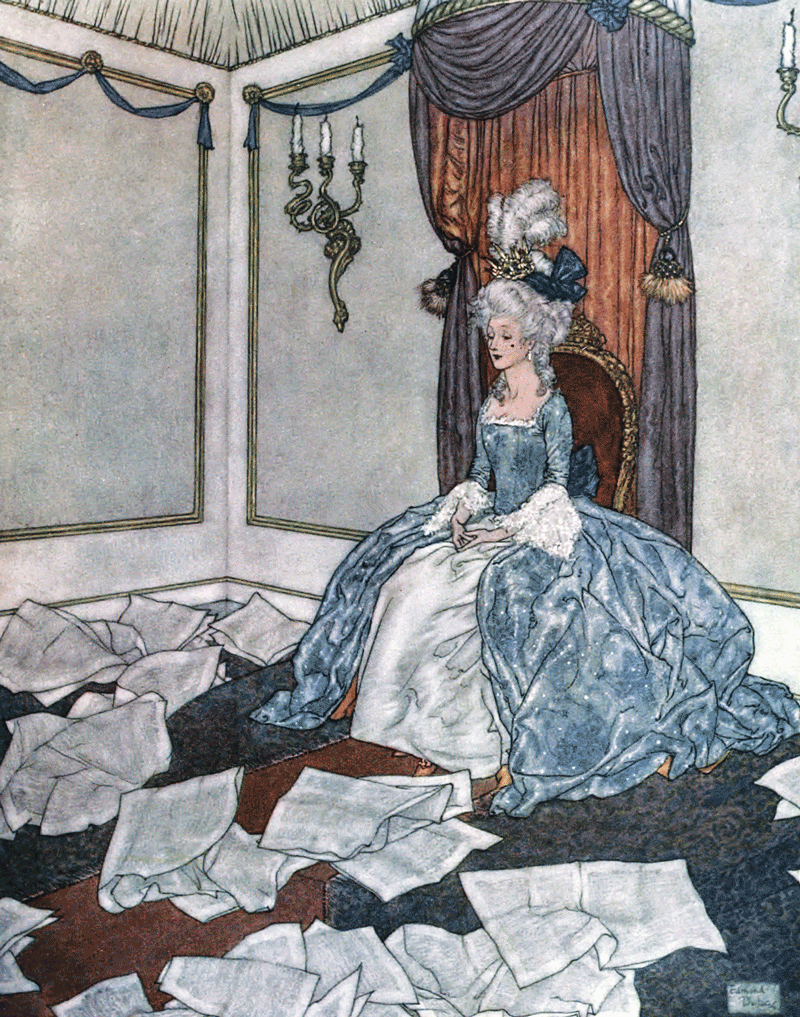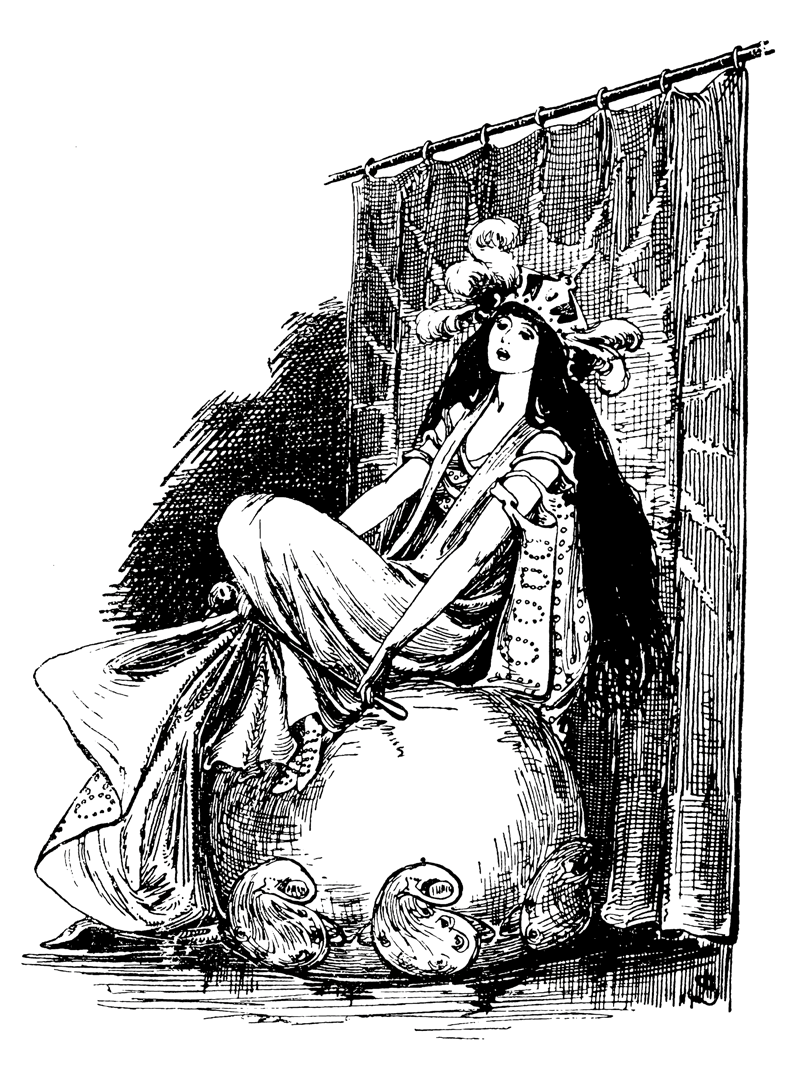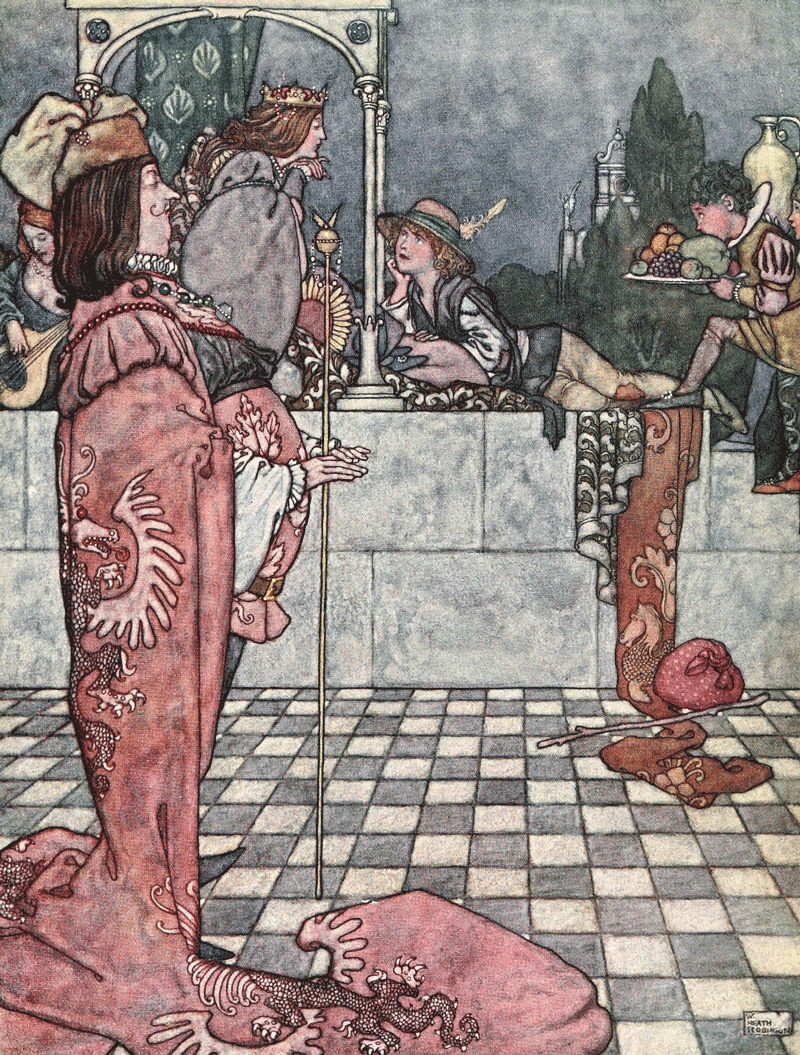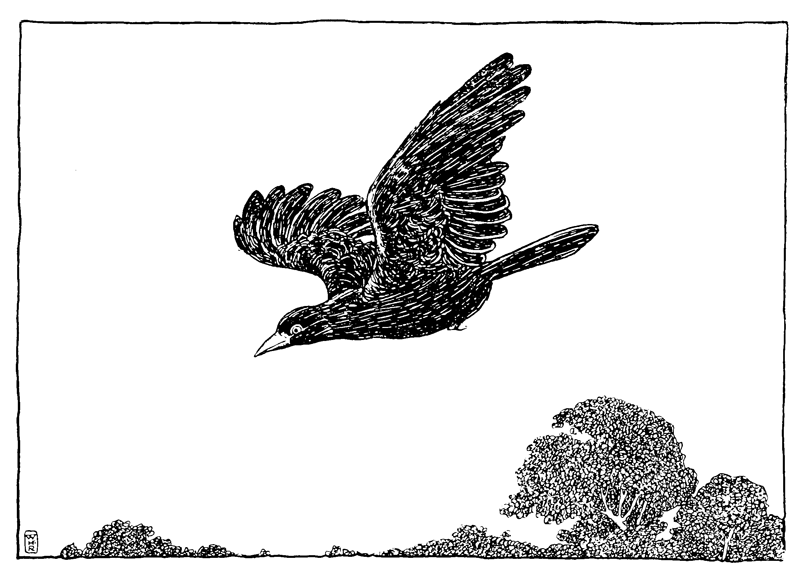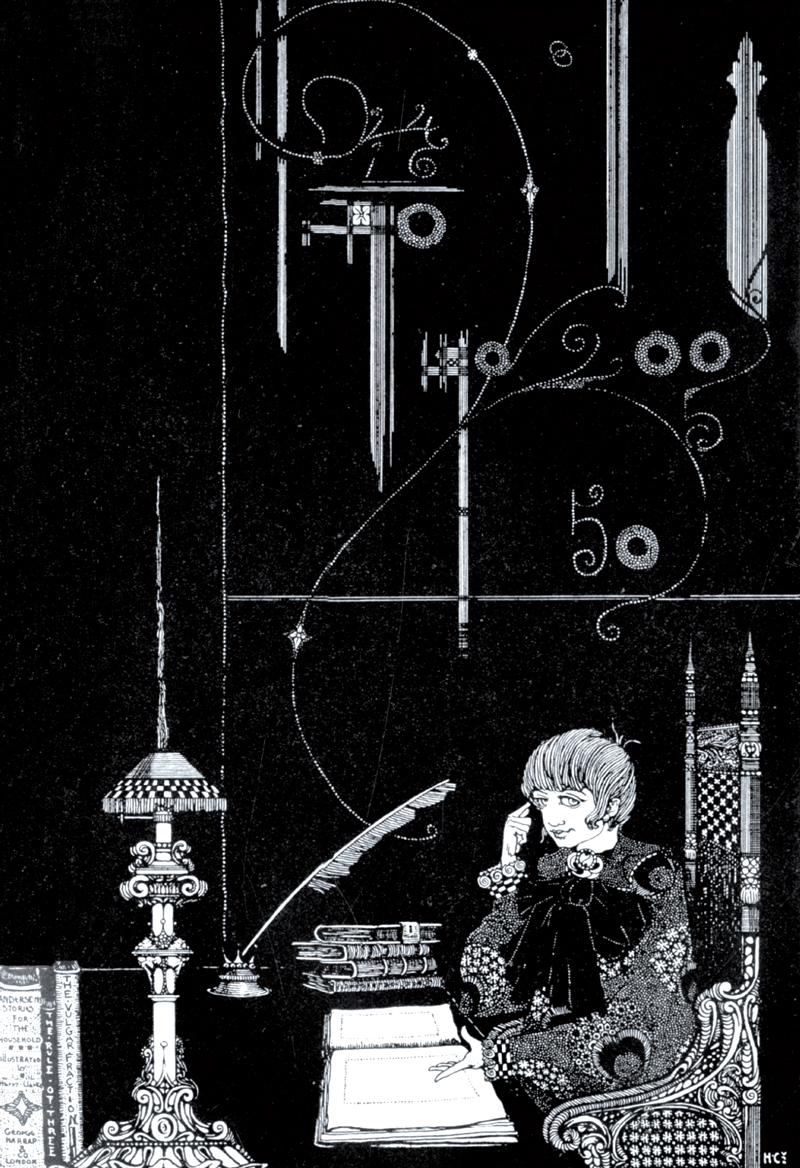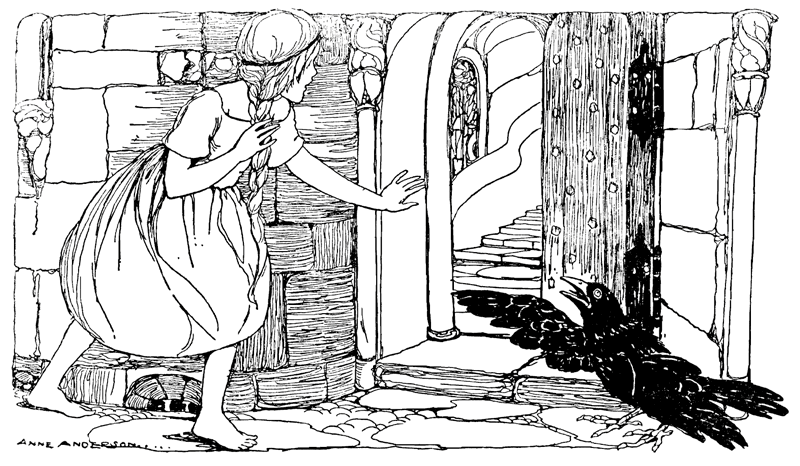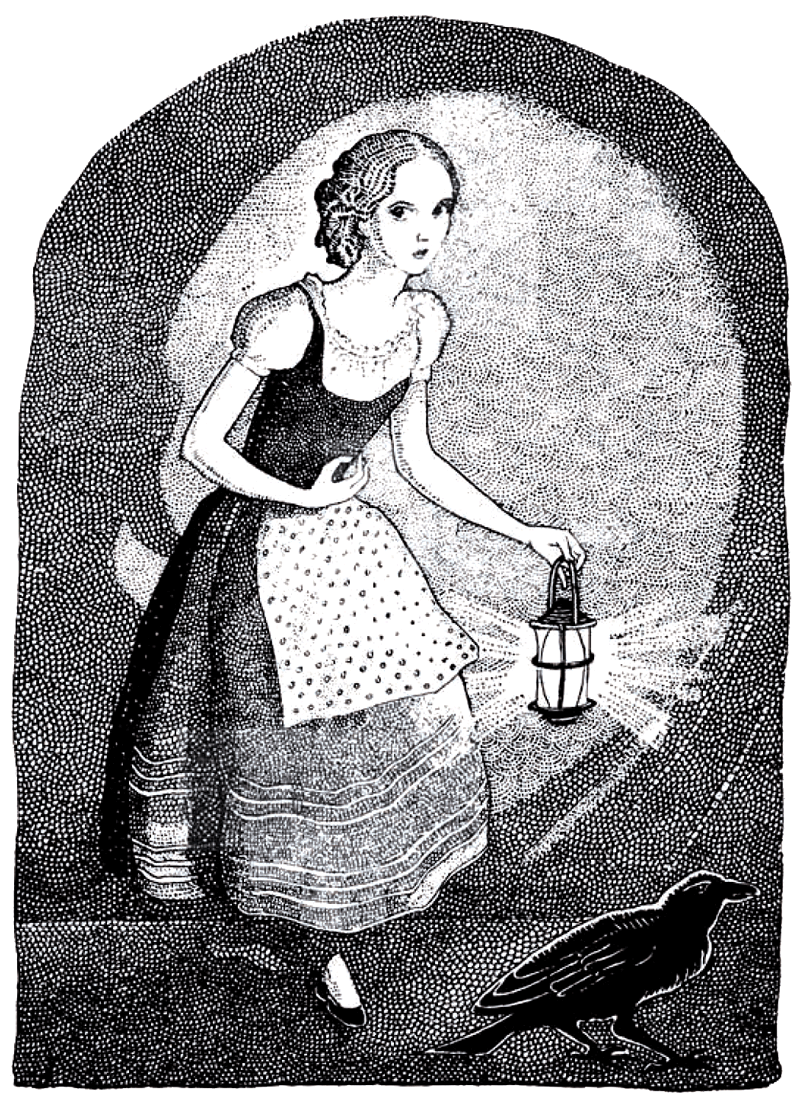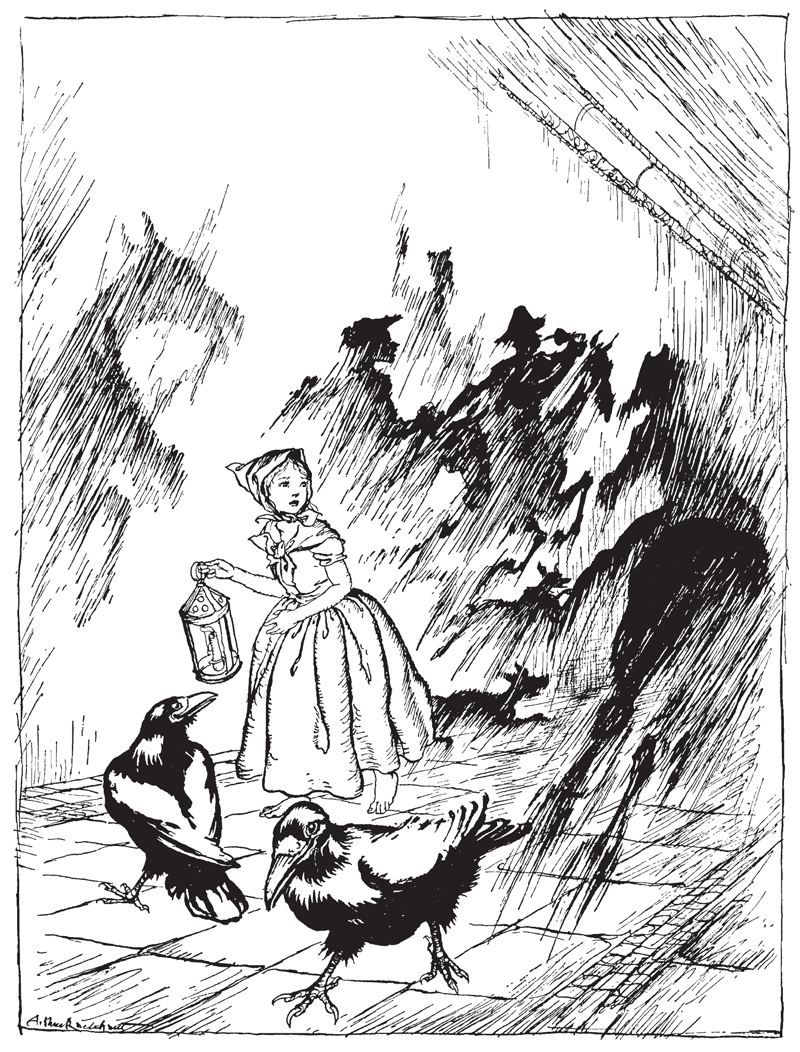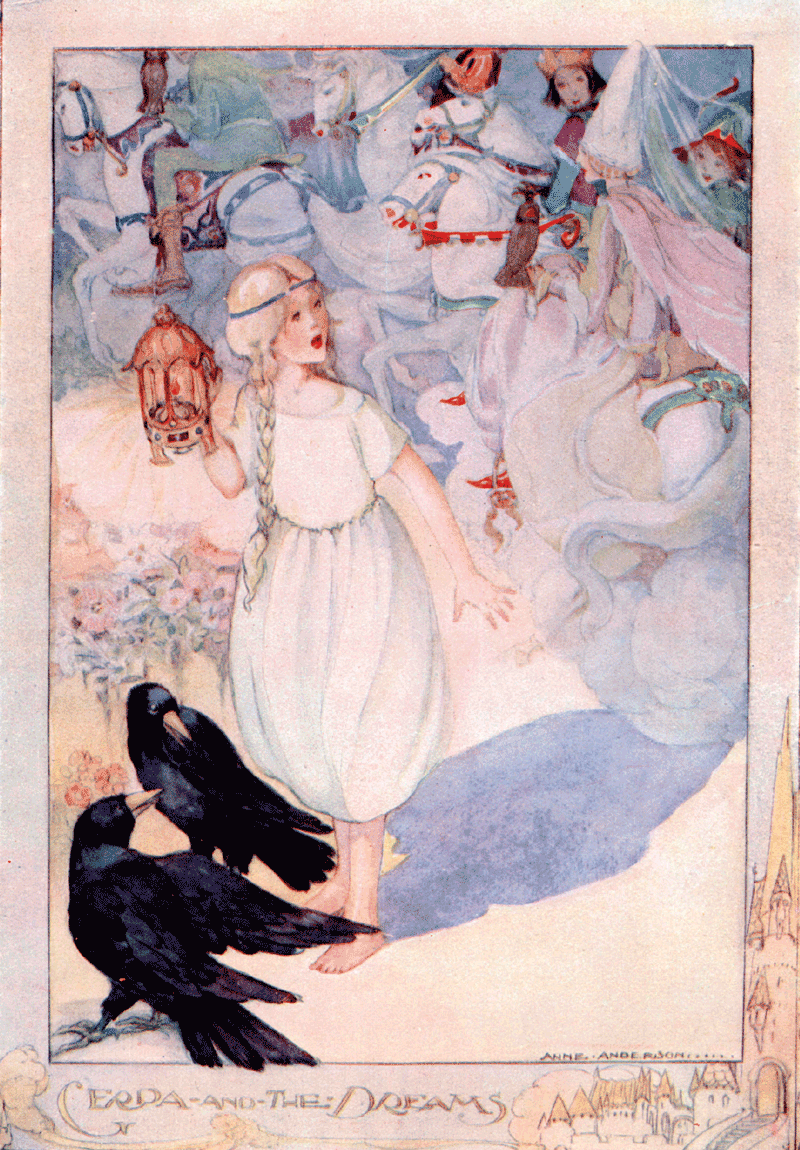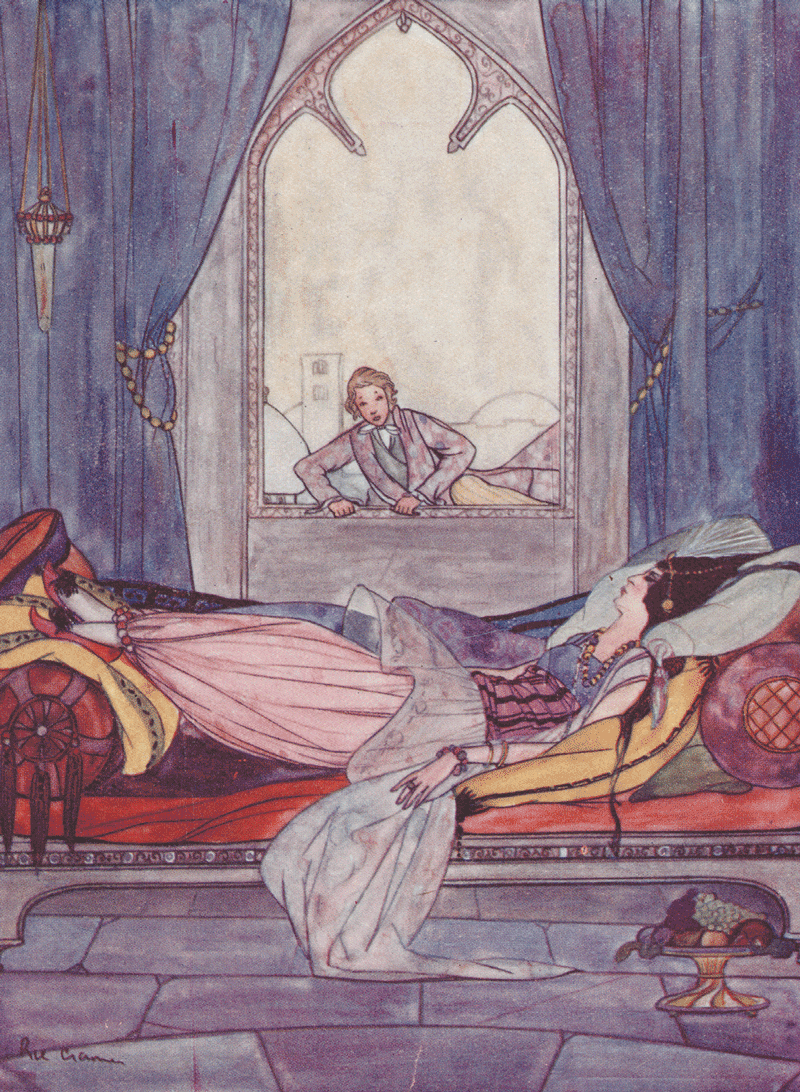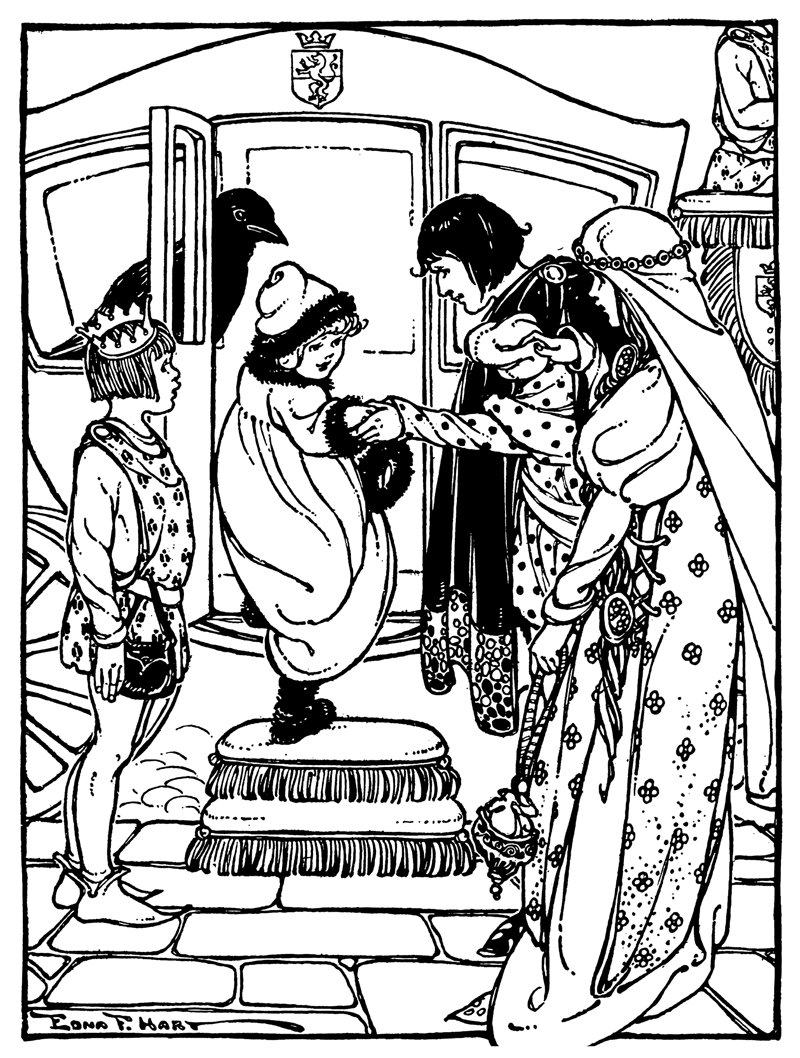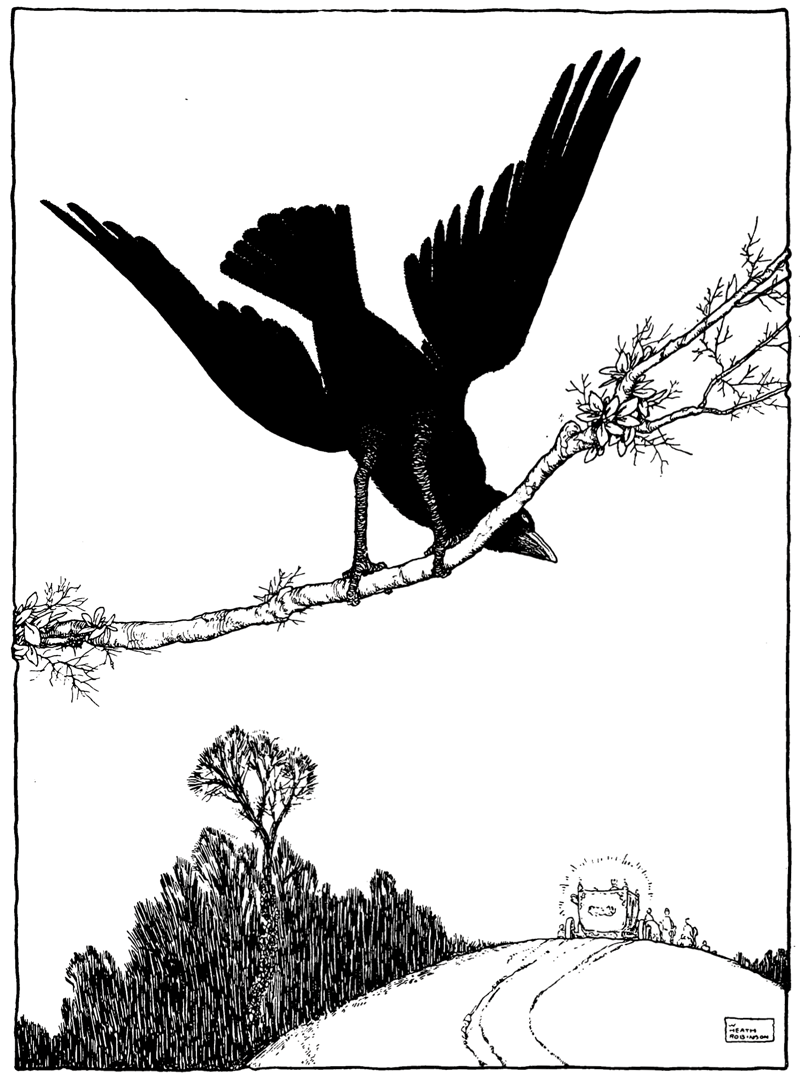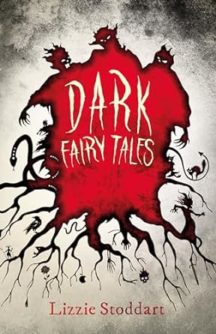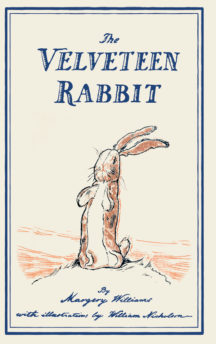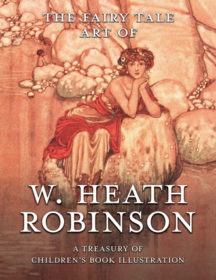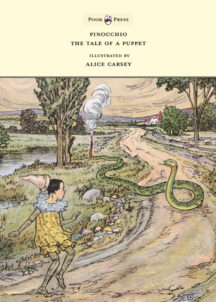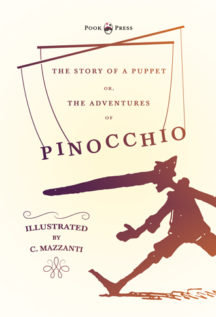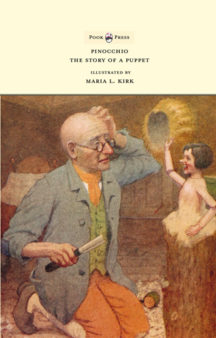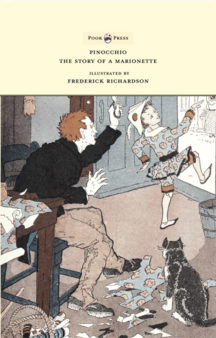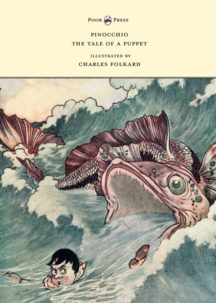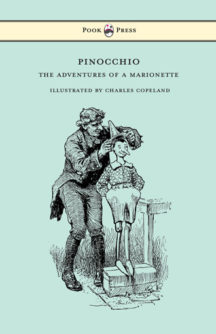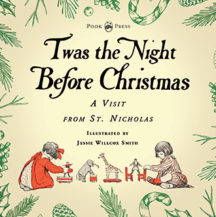The Snow Queen – Fourth Story
THE SNOW QUEEN – FIRST STORY
THE SNOW QUEEN – SECOND STORY
THE SNOW QUEEN – THIRD STORY
The Snow Queen
A Hans Christian Andersen Tale
– Fourth Story –
The Prince and the Princess
Gerda had to rest again soon; and there hopped across the snow, just in front of where she was sitting, a big crow. It stopped a long time to look at her, nodding its head; and then it said, “Caw! caw! Goo’ day! Goo’ day!” It could not say it better, but it meant to be kind to the little girl, and asked where she was going all alone in the wide world. The word ‘alone’ Gerda understood very well, and felt how much it expressed; and she told the crow the whole story of her life and fortunes, and asked if it had not seen Kay.
And the crow nodded very gravely, and said:
“That may be! That may be!”
“What, do you believe so?” cried the little girl, and nearly smothered the crow, she kissed it so.
“Gently, gently!” said the crow. “I think I know: I believe it may be little Kay, but now he has certainly forgotten you for the Princess.”
“Does he live with a princess?” asked Gerda.
“Yes; listen!” said the crow. “But it’s so difficult for me to speak your language. If you know crows’ language I can tell it much better.”
“No, I never learned it,” said Gerda; “but my grandmother understood it, and could speak the language too. I only wish I had learned it.”
“It doesn’t matter,” said the crow. “I will tell you as well as I can, but it will be rather badly.”
And then the crow told her what it knew.
“In the country in which we now are there lives a princess who is quite wonderfully clever—but then she has read all the newspapers in the world, and has forgotten them again, she is so clever. Lately she was sitting on the throne—and that’s not so very amusing, they say—and she began to hum a song, and it was just this,
Why shouldn’t I be married?
‘Wait—there’s something in that!’ said she. And at once she felt she wanted to get married, but she wished for a husband who could answer when he was spoken to, not one who only stood and looked handsome, for that was wearisome. So she called all her maids of honour together, and when they heard what she wanted they were delighted. ‘I like that, now,’ said they; ‘I thought the very same thing myself the other day.’ You may be sure that every word I am telling you is true,” said the crow. “I have a tame sweetheart who goes about freely in the castle, and she told me everything.”
Of course, the sweetheart was a crow too, for birds of a feather flock together, and for a crow there is always another one.
“Newspapers were published directly, with a border of hearts and the Princess’s initials. One could read in them that every young man who was good-looking might come to the castle and speak to the Princess, and the one who spoke in a way that showed he was quite at home there, and who spoke best, him would the Princess choose for her husband. Yes, yes,” said the crow, “you can believe me. It’s as true as I sit here. People came streaming in; there was a great crowding and running to and fro, but no one succeeded either on the first or second day.
They could all speak well enough when they were out in the streets, but when they entered the palace gates, and saw the guards in silver, and at the top of the staircase the lackeys in gold, and the great lighted halls, they became confused. And when they stood in front of the throne where the Princess sat they could do nothing but repeat the last thing she said, and, of course, she did not care to hear her own words again. It was just as if the people in there had taken some sleeping powder and had fallen asleep till they got into the street again, for not till then were they able to speak. There stood a whole row of them, from the town gate to the palace. I went out myself to see it,” said the crow. “They were hungry and thirsty, but in the palace they did not receive so much as a glass of lukewarm water. A few of the wisest had brought bread and butter with them, but they would not share with their neighbours, for they thought, ‘Let him look hungry, and the Princess won’t have him!’”
“But Kay, little Kay?” asked Gerda. “When did he come? Was he among the crowd?”
“Give me time! Give me time! We’re just coming to him. It was on the third day that there came along a little person, without horse or carriage, walking quite merrily up to the castle. His eyes sparkled like yours, he had fine long hair, but his clothes were shabby.”
“That was Kay!” cried Gerda, delighted. “Oh, then I have found him!” And she clapped her hands.
“He had a little knapsack on his back,” said the crow.
“No, that must have been his sledge,” said Gerda, “for he went away with a sledge.”
“That may be so,” said the crow, “for I did not look very closely. But this much I know from my tame sweetheart, that when he came in at the palace gate and saw the Life Guards in silver, and at the top of the staircase the lackeys in gold, he was not in the least abashed. He nodded, and said to them, ‘It must be tiresome standing on the stairs—I’d rather go in.’ The halls were ablaze with lights; privy councillors and excellencies walked about with bare feet, and carried golden vessels. It was enough to make anyone solemn! And his boots creaked dreadfully, but he was not at all frightened.”
“That must have been Kay!” said Gerda. “I know he had new boots on; I’ve heard them creak in grandmother’s room.”
“Yes, certainly they creaked,” said the crow. “And he went boldly in to the Princess herself, who sat on a pearl as big as a spinning-wheel ; and all the maids of honour, with their maids and maids’ maids, and all the cavaliers, with their gentlemen followers and their gentlemen’s gentlemen, who themselves had a page apiece, were standing round; and the nearer they stood to the door, the prouder they looked. The gentlemen’s gentlemen’s pages, who always go in slippers, could hardly be looked at, so proudly did they stand in the doorway!”
“That must be terrible!” said little Gerda. “And yet Kay won the Princess?”
“If I had not been a crow I would have taken her myself, although I am engaged. They say he spoke as well as I do when I speak crows’ language; so I heard from my tame sweetheart. He was merry and agreeable; he had not come to woo the Princess, but only to hear her wisdom; and he thought well of her, and she thought well of him again.”
“Yes, that must have been Kay!” said Gerda. “He was so clever, he could do mental arithmetic up to fractions. Oh, won’t you take me to the palace too?”
“Yes, that’s easily said,” replied the crow. “But how are we to manage it? I’ll talk it over with my tame sweetheart; she can probably advise us; but this I must tell you—such a little girl as you are will never get leave to go right inside!”
“Oh, yes, I shall,” said Gerda. “When Kay hears that I’m there he’ll come out at once and fetch me.”
“Wait for me over there at the stile,” said the crow; and he wagged his head and flew away.
It was already late in the evening when the crow came back.
“Caw! caw!” said he. “I’m to greet you kindly from her, and here’s a little loaf for you. She took it from the kitchen. There’s bread enough there, and you must be hungry. You can’t possibly get into the palace, for you are barefooted, and the guards in silver and the lackeys in gold would not allow it. But don’t cry; you shall get in somehow. My sweetheart knows a little back staircase that leads up to the bedroom, and she knows where she can get the key.”
And they went into the garden, into the great avenue, where the leaves were falling one after the other; and when the lights in the palace were put out one after the other, the crow led little Gerda to a back door, which stood ajar.
Oh, how Gerda’s heart beat with fear and longing! It was just as if she had been going to do something wrong, and yet she only wanted to know if it was little Kay. Yes, it must be he. And she thought so earnestly of his clever eyes and his long hair: she could see how he smiled as he used to when they sat at home under the roses. He would surely be glad to see her; to hear what a long way she had come for his sake; and to know how sorry they had all been at home when he did not come back. Oh, what fear and what joy that was!
Now they were on the stairs. A little lamp was burning upon a cupboard, and in the middle of the room stood the tame crow, turning her head on every side and staring at Gerda, who curtsied as her grandmother had taught her.
“My betrothed has spoken to me very favourably of you, my little lady,” said the tame crow. “Your vita, as they call it, is really most touching. Will you take the lamp? Then I will go first. We will go straight along, for we shall meet nobody.”
“I feel as if someone were coming after us,” said Gerda, as she fancied something rushed by her. It seemed like a shadow on the wall; horses with flowing manes and thin legs, hunters, and gentlemen and ladies on horseback.
“They are only dreams,” said the Crow. “They are coming to carry the nobles’ thoughts out hunting. That’s all the better, for you may look the more closely at them in bed. But I hope, when you are taken into favour and are honoured, that you will show a grateful heart.”
“Of that we may be sure!” said the crow from the wood.
They came now into the first room; the walls were hung with rose-coloured satin embroidered with flowers; and here again the dreams came flitting by them, but they swept by so quickly that Gerda could not see the high-born lords and ladies. Each room was more splendid than the last; one was almost bewildered! And then they came to the bedchamber. Here the ceiling was like a great palm-tree with leaves of glass, of costly glass, and in the middle of the floor were two beds, each hung like a lily on a stalk of gold. One of them was white, and in that lay the Princess; the other was red, and in that it was that Gerda was to look for little Kay. She bent one of the red leaves aside, and she saw a brown neck. Oh, that was Kay! She called his name out loud, and held the lamp over him. The dreams rushed on horseback through the room again—he awoke, turned his head, and—it was not little Kay!
The Prince was like him only in the neck; but he was young and handsome, and the Princess peeped out, blinking, from the white lily bed, and asked what was the matter. Then little Gerda cried, and told them her whole story, and all that the crows had done for her.
“You poor little thing!” said the Prince and Princess.
And they praised die crows, and said that they were not angry with them at all, but they were not to do it again. However, they should be rewarded.
“Will you fly away free?” asked the Princess. “Or would you rather have permanent posts as Court crows, with the leavings of the kitchen as perquisites?”
And the two crows bowed, and begged for permanent posts, for they thought of their old age, and said, “It is so good to have something put by for the old man,” as they put it.
And the Prince got up out of bed, and let Gerda sleep in it, and he could not do more than that. She folded her little hands, and thought, “How good men and animals are!” and then she shut her eyes and went quietly to sleep. All the dreams came flying by again, looking like God’s angels, and they drew a little sledge, on which Kay sat and nodded; but all this was only a dream, and so it was gone again as soon as she awoke.
Next day she was clothed from top to toe in silk and velvet. She was invited to stay in the castle and enjoy herself, but she only begged them to give her a little carriage, and a horse, and a pair of little boots; and then again she would drive out into the wide world and find Kay.
And they gave her both boots and a muff, and she was prettily dressed; and when she was ready to start a new coach of pure gold was there for her before the door. Shining like a star on it was the coat of arms of the Prince and Princess. Coachman, footmen, and the postilions—for there were postilions too—all had golden crowns on their heads. The Prince and the Princess themselves helped her into the carriage, and wished her good luck. The forest crow, who was now married, accompanied her the first three miles. He sat by Gerda’s side, for he could not bear riding backward. The other crow stood in the doorway, flapping her wings; she did not go with them, for she suffered from headache, that had come on since she had got her permanent appointment: she had had too much to eat. The coach was stocked with sugar-cakes, and under the seat there were ginger-nuts and fruit.
“Farewell! Farewell!” cried the Prince and Princess; and little Gerda wept, and the crow wept. And they went on like that for the first three miles, and then the crow said farewell too, and that was the saddest parting of all. And then he flew up into a tree, and beat his black wings as long as he could see the coach, which glittered like the bright sunshine.
THE SNOW QUEEN – FIFTH STORY

